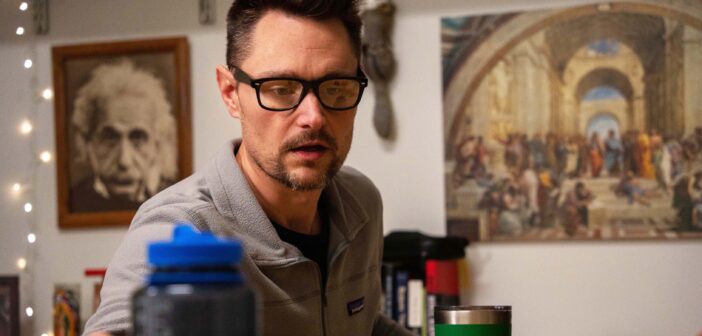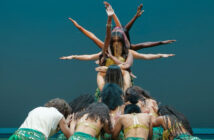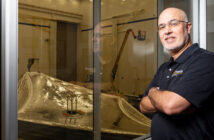A hawk tightly clutches a snake in its talons. The serpent spirals, devouring its tail in a continuous loop.
For Christopher Driscoll, the circular snake, or “ouroboros,” is both an ancient symbol and a glimpse into the future.
An image in his mind’s eye. A spiritual promise that tomorrow will be better.
The hawk is Driscoll’s spirit animal. Snakes can represent transformation, spiritual death and resurrection, and the power to overcome obstacles.
Driscoll, a Lehigh religious studies professor, has just finished his first Reiki meditation session. In his ears, his headphones hum the final tones of the album “Reiki River,” by Niall. He feels pure peace — a sensation absent from a sometimes calamitous life.
He opens his eyes.
He sees water in the Wissahickon Creek trickle downstream, tumbling over rocks and glistening with the sun’s reflection. With his palms, he feels the dampness of the mid-November ground as he rises from his position on the creek’s bank.
Soon, his Reiki practitioners, Kelly Jean Badgley and her mother, Jenny Stinson, will call him to discuss the session. Badgley is in California. Her mother is in Idaho. Together, they helped channel energy toward his body.
Reiki is a Japanese healing technique rooted in the belief that everyone has an invisible “life force energy” that flows through them.
A Reiki practitioner will channel energy into the recipient’s energy field to promote stress reduction, relaxation and healing, Stinson said.
“It doesn’t matter where you are,” Badgley said. “It doesn’t matter what time it is. The Reiki knows where to go. There is no space and time.”
Driscoll tried Reiki, in part, because he saw it as an opportunity to put himself first, but also because friends from his Adult Children of Alcoholics group had encouraged him to start meditating.
He recalls thinking to himself, “Did anything happen?”
Months of meditation had taught him the value of simply sitting in peace, but he wanted to know if this Reiki session did more.
So, he went home. He walked his dog. He ate dinner.
It wasn’t until the next day that he realized the session’s impact.
When Driscoll awoke on Nov. 14, 2020, he knew he needed a change. He sat up and looked at Samson, his Bernese mountain dog, and began to cry.
“I thought to myself, ‘I have got to get out of this situation, even if it means leaving my dog behind,’” he said.
Like the image of the hawk and the snake, the thought came to him unbidden. It was just there. In just 10 days, he loaded his car, placed Samson in the backseat, and left Philadelphia, leaving both the city and a failed marriage behind.
Despite growing up in a religious household, he had spent the last decade convinced he was an atheist. That Reiki session, however, became one supernatural occurrence in a string of many to shake the skeptic in him, and eventually, in his work.
In addition to its physical benefits, Stinson said that she’s seen Reiki heal people from emotional afflictions.
“It’s changed people’s lives,” she said. “It’s sent them in the direction of their life purpose.”
Driscoll was taught how to teach based on the idea that the study of religion and the practice of religion should be separate. He realized he had spent years teaching students how to let go of their beliefs — a practice he called “mean.”
Now, he tries to create academic experiences that show students that there’s more to life than what they can see, feel or quantify by scientific measurements.
But it was a long road to get there.
Unraveling Trauma: Rediscovering Faith
Driscoll’s formative years in Shreveport, Louisiana, were marked by familial instability. He said religion offered his family support when it was difficult to find at home.
“My dad was an alcoholic, and it led to a lot of chaos,” Driscoll said. “Religion was how we essentially escaped from that dysfunction. It offered a very real structure. We couldn’t trust my dad to do X, Y or Z, but we could trust the other people at church to show up when they said they were going to show up.”
Although the church offered structure, he remained unconvinced of religion’s positive influence.
From the ages of 10 to 11, Driscoll said he endured a haunting experience as a victim of grooming and abuse within the church. He began to withdraw, growing noticeably despondent, angry and reserved.
Roughly a year after the abuse began, he recalls playing in the church’s recreation room with other children when his abuser, the pastor’s teenage son, walked in. In the center of the room was a pool table.
Driscoll watched as the 17-year-old approached some of his friends, then unaware of the abuse, and told them a joke. Though he was not part of the conversation, Driscoll knew he was being mocked. He watched them laugh. He became so angry, that he acted without thought, picking up each of the pool balls from the pool table and throwing them at his abuser as hard as he could manage.
“It was a fit of childish rage,” Driscoll said. “People were asking, ‘What’s gotten into Chris?’”
After being reprimanded for his actions, he confided in his mother about the nature of the abuse. She confronted the pastor, whose son ultimately confessed. Although this revelation effectively ended the abuse, it was the start of a life-long source of trauma.
Driscoll said no further action was ever taken by the church.
The church’s inaction defined his relationship with religion for years afterward. Although he understood that churches welcomed everyone, he couldn’t make sense of why the church allowed his abuser to continue attending services.
“I didn’t understand why anyone would prioritize God’s needs ahead of the needs of children,” he said.
As he got older, he became increasingly interested in understanding why people devote their energy and emotional well-being to things they cannot see.
He went on to earn a bachelor of arts degree in religion from Texas Christian University. By his senior year, his education had conditioned him into believing he was an atheist.
“During COVID, I had this profound realization that I had never really been an atheist,” he said. “I had been angry at God, so angry at God that I decided to act like God didn’t exist.”
Driscoll began meditating in March 2020, the first month of the COVID lockdown. Two years prior, he began attending a twelve-step program called Adult Children of Alcoholics — frequently abbreviated as ACA — although he has never struggled with addiction himself.
ACA, like many 12-step programs, requires a belief in a higher power. By participating in ACA, Driscoll was forced to confront his relationship with God.
“My relationship to God was inexorably connected to the loss of my father,” he said. “I realized that I still never really healed from the loss of my dad. Two losses, actually; my dad’s physical death when I was 19, but also the loss that any child feels when their parent is addicted to drugs or alcohol.”
The people he met and the work he did in ACA gave him the tools he needed to begin a meditation practice.
He found meditation agonizing at first. It took him weeks to find it enjoyable.
“It was tough because it was so boring,” he said. “I wanted to stab my eyes out.”
Six months before the Reiki experience, while listening to a guided meditation on YouTube, he fell into a deep trance. In his mind’s eye, a Capuchin monkey appeared.
The monkey, whom Driscoll endearingly refers to as Cappy, led him through a jungle. It brought him to a place where the trees cleared, and Driscoll saw his 10-year-old self. In what he describes as an out-of-body experience, Driscoll and his younger self had a deeply healing conversation.
At times, his younger self cried, and Driscoll consoled him the way an adult or parent would. In other moments, Driscoll cried and his younger self reassured him.
Driscoll apologized to his younger self for not protecting him.
“(My younger self) did not just say that it was OK,” he said. “He didn’t let me have it either. He gave me this whole story about how he felt at the time of the abuse and explained to me the most emotionally painful part about dealing with it.”
Driscoll says emotions have no relationship to time. Though they are the same person, it was important to the grown-up inside him to apologize.
Driscoll acknowledges his descriptions may seem outlandish or resemble cultural appropriation, but as an academic, he understands the scientific explanation behind his experiences.
“Scientifically, I was unlocking repressed memories,” Driscoll said. “And if that’s all it was, I’m still thrilled for the experience because it freed me up to bring that little kid version of myself into alignment with the big kid version of me, and the benefits have been overwhelming.”
The experience showed him that life can be good.
He had spent years allowing cynicism, anger and sadness to determine his outlook on the world and to influence his work and teachings. Though he never explicitly told students that the world was a bad place, he feels he only taught them part of the story.
“The whole story is that life is hard,” Driscoll said. “Bad things happen. People are going to hurt us. The people we love are going to hurt us worse than the people we don’t love. But it’s important for us to keep on loving and to keep on recognizing that other people are important. Other people are what really bring value to this experience that we all share together.”
Transformative Education: Mindfulness and Exploration in the American West
Last semester, Driscoll could be found in Wyoming and New Mexico teaching Lehigh Launch’s integrated seminar, which he and students refer to simply as “mindfulness.” The program is open to all incoming first-years who want to spend their first semester living and learning together in the American West.
Trinity Trainor, ‘26, took the course last year. She says that throughout the seminar, they learned about different types of meditation and were required to meditate for 15 minutes daily.
“The theme throughout was that you don’t have to shut your brain off to meditate,” Trainor said. “You can still have thoughts as long as you acknowledge them and let it pass. It was like a flowing river of thoughts — just let them keep going.”
Driscoll said he believes higher education in America is in a value crisis. He said that the cost of Lehigh’s tuition exceeds the value of a degree.
What he loves about the Lehigh Launch American West program is that it helps bridge that gap. Included in students’ tuition is a National Outdoor Leadership course, which Driscoll said normally costs $10,000 to $15,000.
Sam Anderson, ‘26, said that participating in Lehigh Launch changed the course of her life.
“I came into Lehigh thinking I wanted to work with cars,” Anderson said. “Now, I’m on track to work with water resources and policy, specifically in the West, or other parts of the world. I feel like the issues that we discussed are things that will stay with you, and I can’t help but continue to pursue that.”
Embracing Change: Joy and Connection in Boise
Today, Driscoll lives in Boise, Idaho. He’s joined by Kelly Jean Badgley — his Reiki practitioner turned partner.
Currently, he’s teaching “Religion and the Paranormal” and “Is God dead?” remotely. Next semester, he’ll be taking a leave of absence to work on independent projects that are related to increasing the equity of education.
He’s unsure if he’ll return to Lehigh after.
“I still love Lehigh,” Driscoll said. “Not to speak melodramatically, but I can’t stay there and forsake the things that bring me joy in my spirit. And that is mostly the mountains, my family and rap music, some days.”
The Reiki community in Boise is extensive. While Driscoll only receives full Reiki sessions once or twice a year, he gets small 10-minute sessions frequently from friends and family in the community.
Badgley said their first Reiki session brought her and Driscoll together. That day, they both saw the circular snake — the ouroboros — that promised a better tomorrow.
“Even if there’s nothing magical (about the experience),” Driscoll said, “If God’s not involved, or whatever, I still think it’s incredible that our human brains are somehow connected to these archetypes, or these powerful symbols that seem to arrive to us in moments when we need them.”
He says life has become increasingly more fun since he’s embraced sharing “weird” experiences.
He spends his days with Kelly, her daughter Elle, and their daughter, Vayda. In Boise, he is never more than minutes from the mountains, which he calls his first love.
For Driscoll, tomorrow has arrived.






Comment policy
Comments posted to The Brown and White website are reviewed by a moderator before being approved. Incendiary speech or harassing language, including comments targeted at individuals, may be deemed unacceptable and not published. Spam and other soliciting will also be declined.
The Brown and White also reserves the right to not publish entirely anonymous comments.
1 Comment
Y